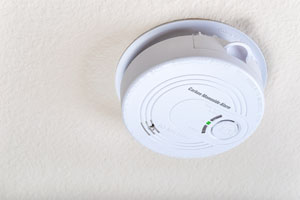
Any appliance that relies on fuel to produce energy – whether it’s powered by wood, coal, heating oil, propane, or natural gas – produces at least some carbon monoxide (CO) as it operates. In small amounts, CO is harmless – but, if it builds up in your home, it can cause carbon monoxide poisoning – a dangerous and potentially even lethal threat.
Here are the six important things to know about carbon monoxide safety – please read them carefully and share this information with everyone in your North Carolina home.
Q. What is carbon monoxide?
A. Carbon monoxide (CO) is an odorless gas produced whenever a fuel is burned.
Q. What causes a buildup of CO?
A. CO buildup usually occurs for two reasons: poor ventilation or damaged / poorly maintained equipment.
Q. What kind of risks does carbon monoxide pose?
A. In high amounts, carbon monoxide can cause CO poisoning, which can lead to illness, unconsciousness, or even death.
Q. What are the symptoms of CO poisoning?
A. Symptoms of CO poisoning worsen as exposure to the gas increases
Q. What should I do if I experience CO poisoning symptoms?
A. If you or anyone in your home experiences CO poisoning symptoms:
Q. What should I do if the CO alarm sounds?
A. If the CO alarm sounds, presume it is working correctly and:
Q. How can I avoid having CO problems in my home?
A. You can avoid CO problems in your home if you:
At Rand Wade Oil, your safety is always our priority! If you have any questions about carbon monoxide or propane safety, contact us today.